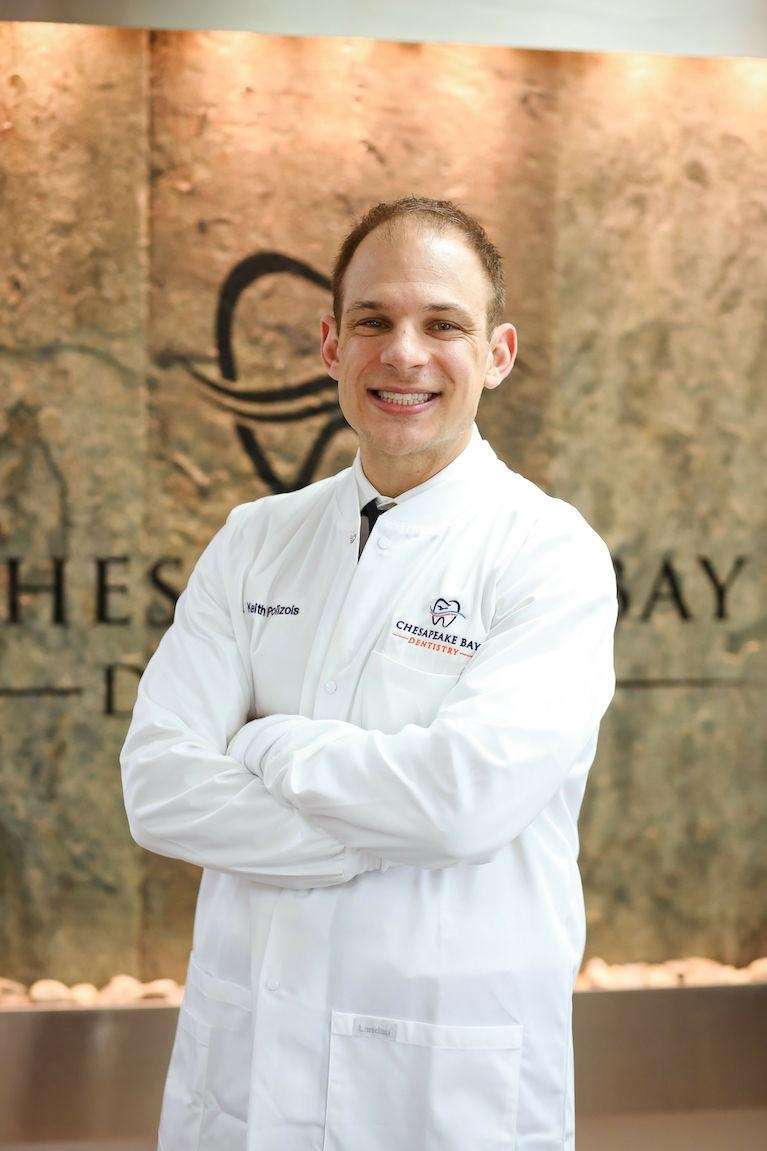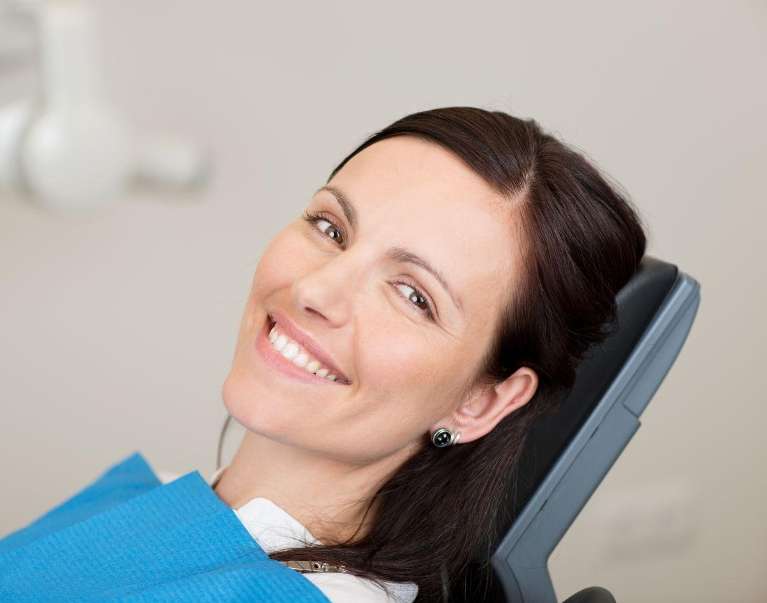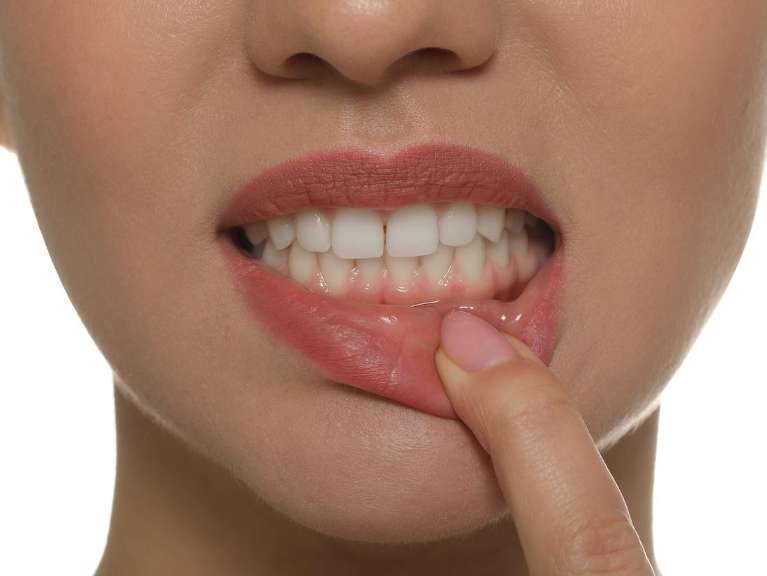
Periodontal Disease in Annapolis, MD
According to the Centers for Disease Control and Prevention, almost half of American adults suffer from some degree of gum disease—also called periodontal disease—which, left untreated, can lead to tooth loss or systemic health issues. The Chesapeake Bay Dentistry team works to eliminate the risks for our patients or treat their symptoms should gum disease arise.
Our dentist gently but thoroughly treats this disease in his Annapolis dentist office using skill, kindness, and the latest technologies. And Dr. Polizois and his compassionate support staff are with you throughout the process.
We are a judgment-free dental office and only want to restore your oral health with kindness and skill.
If you suspect periodontal disease or have already been diagnosed, we invite you to reach out to a support member to schedule a consultation and begin the treatments that can save your smile.
Meanwhile, check out the information below. These are the questions we hear most often from patients and potential patients seeking periodontal treatment in 21401.
Meet Our Doctor:

Dr. Keith Polizois DMD, MAGD
Keith Polizois, DMD MAGD grew up in northern New Jersey and received his undergraduate degree from Salisbury University. While playing football for the Seagulls, he graduated Summa Cum Laude with dual degrees in biology and chemistry. He then went on to earn his Doctor of Dental Medicine from the University of Florida College of Dentistry.
After dental school, Dr. Polizois completed a post-graduate General Practice Residency at the Washington DC Veterans Affairs Medical Center and received extensive training in advanced dental procedures. Dr. Polizois was honored to have the opportunity to ...
What is periodontal disease?
 Periodontal disease is a series of infections and inflammation in the gum area. These complications can destroy bone and weaken the ligaments that support your teeth, making chewing and brushing difficult and painful.
Periodontal disease is a series of infections and inflammation in the gum area. These complications can destroy bone and weaken the ligaments that support your teeth, making chewing and brushing difficult and painful.
While there may be a predisposition genetically for gum disease, the disease itself and its progression are preventable through proper dentistry and an excellent brushing and flossing schedule at home.
Our dentist or hygienist can provide guidelines to help you with your at-home routine, which is crucial to your success—whether lowering your risks or working to restore better oral health following a diagnosis.
Periodontal disease has been linked to systemic health conditions, and lowering your risks is crucial.
What are the risks?
When thinking about periodontal disease, consider the risks for developing the condition and the risks that set in if you are diagnosed.
Your risks for developing periodontal disease increase significantly when you skip preventive dental exams and teeth cleanings. Exams catch gum disease in its early stages—gingivitis—when it is still reversible. Periodontitis, however, is only treatable. And regular teeth cleanings in Annapolis, MD lower your risks for developing gum disease.
It’s also important to brush and floss your teeth at least two times every day and always before you sleep at night. You should never go to bed without a clean mouth as oral health conditions like cavities and gingivitis can develop or start to develop during sleep.
It’s also important to give up smoking and tobacco use.
If you already have gum disease, seeking treatment is crucial. Recent studies have linked periodontal disease to heart problems, stroke, rheumatoid arthritis, Alzheimer’s disease, and low birth weight in babies. Treatment can significantly lower these risks.
What are the symptoms of periodontal disease?
Gingivitis and periodontal disease can exhibit similar symptoms—especially early on. For this reason, regular dental checkups are critical. Additionally, symptoms may not show up right away or be so gradual that you don’t notice until the case is advanced.
If you have periodontal disease, you may notice:
- Bleeding gums, especially when brushing or flossing
- Gum recession or gums pocking away from teeth
- Bad breath or a bad taste in the mouth
- Loose or shifting teeth
- Pain when brushing, flossing, or eating
- Red, swollen gums
- Periodic or ongoing toothaches
Research has shown that poor oral health may contribute to systemic health problems. It’s important to remember that infections can spread where they may!
Dr. Polizois is here to help you combat periodontal disease, and he holds no judgments. Our compassionate dentist simply wants to save your smile and your health.
Frequently Asked Questions
 If your gums are bleeding, our Annapolis, MD dentist wants you to make a dental appointment today!
If your gums are bleeding, our Annapolis, MD dentist wants you to make a dental appointment today!
Bleeding gums can indicate that you’re brushing or flossing incorrectly, but often it signifies a more significant problem.
Gum health is the foundation of healthy teeth. Gum health also contributes to overall wellness. Too many studies have shown that untreated gum infections lead to systemic problems in the body.
Signs of Periodontal Disease
Other signs of periodontal disease may include:
- A bad taste in the mouth
- Swollen gums
- Periodic or chronic toothaches
- Loosening teeth
At Chesapeake Bay Dentistry, our dentist treats periodontal disease gently but aggressively. In other words, you’ll be made comfortable during periodontal treatments, but deep cleanings below the gumline and a scheduled maintenance plan will be put into play.
Our periodontal program is research-based, technology-driven, and successful because we are dedicated to your wellness and take a progressive approach to bringing your oral health in line.
Contact Our Annapolis Dental Clinic
Don’t let periodontal disease compromise your teeth or your wellness; our dentist is here to help. Get in touch with us to schedule an exam.
Gum disease, also called periodontal disease, generally takes years to set in. Because of its gradual appearance, in the early stages, it might be harder to notice than some of our patients might expect. There are several stages of gum disease of increasing severity.
Gingivitis
The first stage of gum disease is gingivitis. It is the only stage of periodontal disease that is reversible, so it is critical to act against gingivitis right away to prevent it from becoming periodontitis. The gums are red, swollen and puffy, but they may or may not hurt at the early stages of gingivitis.
Periodontitis
As the bacteria builds up, it produces plaque and other waste that clings to teeth, keeping the gums from forming a healthy seal against the enamel. This makes it easier for bacteria to get below the gum line, further increasing plaque build-up, causing inflammation and damage to the gums that will cause them to start to recede.
Advanced Periodontitis
At this stage, the pockets forming around the teeth deepen more with the additional jaw bone and gum loss. It is significantly easier for food particles and bacteria to make it into the gumline. At this stage, tooth loss becomes a real risk, and while the damage is not reversible, the underlying issues can still be treated, and other dental solutions can be implemented to help repair the patient's smile.
Gum Disease Treatment Annapolis, MD
Are you looking to get up to date on your dental visits or currently seeking treatment for gum disease in the greater Annapolis area? Contact us to schedule an in-depth examination.
The only stage of periodontal disease, often called gum disease, that is fully reversible is the first stage, gingivitis. After it progresses to periodontitis, the damage to the gums, teeth, and jaw becomes permanent. However, not all hope is lost. The underlying causes of the advancing gum disease can be treated to stop it from progressing.
With the use of other dental procedures and extra care, we can repair some of the damage gum diseases can cause and give our patients their smiles back.
It's Best to Avoid Gum Disease All Together
Cleanings are vital because they allow the dentist or certified dental assistant to clean off built-up plaque. Checkups allow dentists to monitor the advance of gum disease and the effectiveness of a patient's cleaning routine.
Dental Cleanings and Gum Disease Treatment
Whether you're trying to avoid gum disease or treat it, the dental team at Chesapeake Bay Dentistry is here for you. We are a no judgment dentist, so if you have fallen behind on your dental care and are looking for the opportunity to get back on track, contact us today to schedule an examination.
If adequate bone is available, implants can help secure a loose denture so it doesn’t move. In addition to being terrific anchors for stabilizing the denture, they can increase chewing force for a denture. A denture that is held in by an implant can have up to 10 times the chewing force of a traditional denture.
Call Our Annapolis Dental Clinic
Your Annapolis, MD dentist at Chesapeake Bay Dentistry would be happy to look at your dentures and help you decide the best course of action. Give our office a call to schedule your appointment today!
How do you diagnose periodontal disease?
Periodontal screenings play a large role in preventative dentistry, which is why Dr. Polizois recommends regular dental visits and professional teeth cleanings.
Healthy gums fit snuggly around teeth. When pockets develop, our hygienist or dentist notes the first signs of periodontal disease. They share their findings with you, and your dentist creates a treatment plan that addresses your particular level of disease.
When gums recede away from teeth, this creates pockets for bacteria and serious dental infections. Gum disease damages tissue, periodontal ligaments and leads to bone loss. Eventually, periodontal disease will claim your teeth.
Intervention by our top Annapolis, MD dentist is crucial for salvaging your teeth and stopping the spread of infection.
How do you treat periodontal disease in Annapolis?
Our periodontal program is top-notch, and we provide specialized dental cleanings—deep cleanings below the gumline–to bring you back to better oral health. Scaling and root planing means helping your gums reattach to your teeth with contouring and removing disease.
We may also customize a treatment schedule based on the extent of your periodontal disease.
Our top Annapolis, MD dentist will keep you relaxed and comfortable throughout all periodontal treatments, offering pillows, blankets, nitrous oxide, and oral sedation to help you feel at ease.
Do you offer dental sedation near Loretta Heights, MD?
Your sedation dentist in Annapolis, MD is very gentle but also understands dental phobia and anxiety. We never want to see you forego dental care for these reasons, which is why we offer sedation dentistry.
Sedation dentistry in our dental office relies on one or more options to produce the desired relaxation level. Your dentist may opt for one option or two, depending on your need.
Nitrous oxide is a calming gas administered through a nasal mask. It produces feelings of relaxation and disconnection. These effects wear off as soon as your dentist removes the mask, making it okay for you to drive home from your appointment safely.
Oral sedation is a pill you take approximately one hour before your dental procedure. It allows you to follow directions from your dentist, but you may forget the majority of your procedure. You will need a friend or family member to drive you to and from your dental appointment.
Your dentist can combine these methods for ultimate relaxation and treatment ease, but the first step is a chat—and possible medical history conversation—with your dentist. We want to make sure we choose the best option for you.
How can I lower my risks through oral hygiene?
 If you’ve been diagnosed with periodontal disease or would like to take measures to prevent the disease, we recommend the following at-home strategies:
If you’ve been diagnosed with periodontal disease or would like to take measures to prevent the disease, we recommend the following at-home strategies:
- Brushing your teeth at least twice per day
- Flossing at least twice per day
- Following any at-home instructions provided by Dr. Polizois
The way you brush and floss your teeth is also important. Be sure to clean every tooth on all surfaces, spending a few minutes on your smile overall. You should also use a clean piece of floss as you move between your teeth—and never tug!
Based on the extent of your periodontal disease, Dr. Polizois will give you the best preventative tips to use at home.
Featured Blog Posts - Periodontal Disease
Why Periodontal Disease Treatment Is Essential for Your Overall Health in Annapolis, MD

Your smile is more than just a smile; it’s a window into your overall health. At Chesapeake Bay Dentistry, we believe treating periodontal disease is about more than healthy teeth and gums. It’s about protecting your overall health.
Ignoring the signs of periodontal disease can have life-altering consequences. You deserve ...
Understanding Periodontal Disease and Treatment Options in Annapolis, MD

Periodontal disease affects millions of Americans because many don't recognize the early warning signs. As your trusted dental team in Annapolis, MD, we believe understanding how the disease progresses is the first step toward effectively preventing and treating it.
Gum Disease Symptoms
Periodontal disease, commonly known as gum disease, often begins subtly ...
Ways You Can Help Prevent Gum Disease

Do you have sore or reddened gums? Do you notice a bit of blood coming from your mouth when your brush or floss between your teeth? If so, you may be suffering from gum disease or periodontal disease. This condition comes in many forms and stages but may progress ...
Save Your Smile with Our Comprehensive Periodontal Program in Annapolis
If you’ve been diagnosed with periodontal disease, or if you’ve noticed symptoms, don’t wait to see our dentist and hygienist. Contact us today to schedule a gum evaluation.